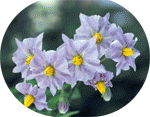| Abstract Detail
Plant Protection Munyaneza, Joseph [1], Crosslin, James [2]. Susceptibility of Potato to the Columbia Basin Potato Purple Top Phytoplasma and its Impact on Potato Tuber Quality. RECENTLY, the Columbia Basin potato purple top phytoplasma has been identified as the causal agent of the recent potato purple top disease outbreaks that occurred in the Columbia Basin of Washington and Oregon. It has also been determined that the beet leafhopper, Circulifer tenellus, is the major vector of this phytoplasma in this important potato growing region of the United States. Transmission studies were conducted in the laboratory using phytoplasma-infected beet leafhoppers to determine the susceptibility of different potato cultivars to the phytoplasma. Varieties tested include Ranger Russet, Russet Burbank, Shepody, Umatilla Russet, Russet Norkotah, Alturas, Atlantic, FL-1879, FL-1833, and FL-1867. Also, the impact of this phytoplasma on the potato tuber quality was assessed by measuring specific gravity, fry color, and checking for internal defects. Results indicated that some potato cultivars are more susceptible to the phytoplasma than others, at least under laboratory conditions. Umatilla Russet, Ranger Russet, Russet Norkotah, and Shepody were very susceptible, whereas Alturas and Russet Burbank showed some degree of resistance to the phytoplasma. Also, chipping cultivars Atlantic and FL-1879 were very susceptible to the phytoplasma. Processing results indicated that there were significant differences in tuber solids and sugar content between infected and non-infected potato plants. Some of the tubers from infected potato plants showed 100% No. 4 USDA fry color, which is not commercially acceptable. In addition, tubers from infected potato plants produced commercially unacceptable chips in all the chipping cultivars tested. Very few internal defects were observed.
Log in to add this item to your schedule
1 - United States Department of Agriculture, Agricultural Research Service, Yakima Agricultural Research Laboratory, 5230 Konnowac Pass Road, Wapato, WA, 98951, USA
2 - United States Department of Agriculture, Agricultural Research Service, Forage and Vegetable Crop Research Unit, 24106 N. Bunn Road, Prosser, WA, 99350, USA
Keywords:
potato purple top phytoplasma
susceptibility
Yield and quality
beet leafhopper
Columbia Basin.
Session: PAA02a-2
Location: Hall of Ideas Room E/Monona Terrace
Date: Monday, July 24th, 2006
Time: 1:45 PM
Abstract ID:59 |
